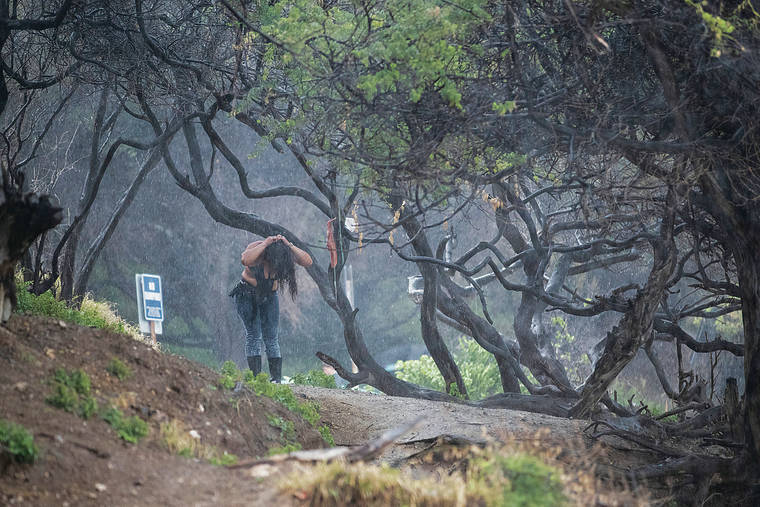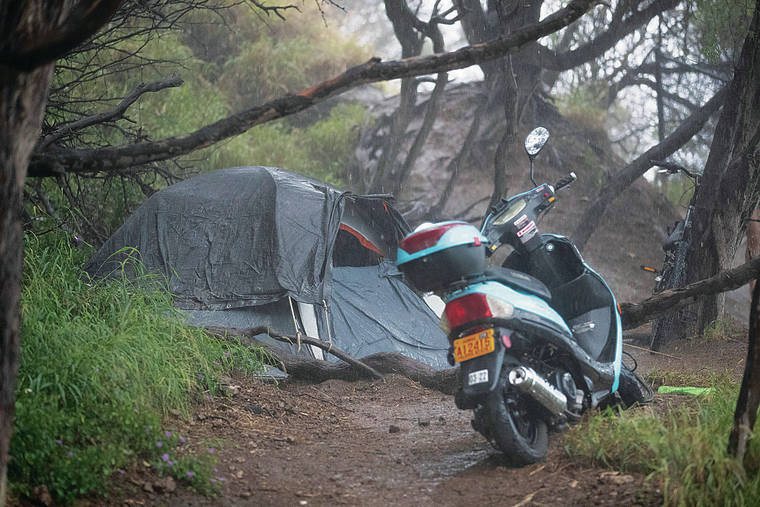Illegal campsites creating problems at Diamond Head Beach Park

GEORGE F. LEE / GLEE@STARADVERTISER.COM
Above, a homeless person endured last week’s heavy rain at Diamond Head Beach Park after beachgoers had left the area.

GEORGE F. LEE / GLEE@STARADVERTISER.COM
A moped was parked last week near an illegal campsite at Diamond Head Beach Park.


The Honolulu city beach parks makai of Diamond Head Road are crowded with walkers, surfers, fishers, beachgoers and sightseers from dawn to dusk.
But as daylight fades, people arrive to spend the night at illegal campsites in the underbrush or to engage in drug dealing, prostitution and other criminal activity, according to Tommy Waters, chairman of the Honolulu City Council.
“The community is at its wits’ end,” Waters said. “At dusk you see the caravan of people come up from Waikiki and Kapiolani Park, and by 10 p.m. they’re already in there.”
With no restrooms at any of the Diamond Head beach parks — “only the showers that are used as an open sewer” — it’s also “causing a sanitary crisis,” Waters added, noting the parks are inhabited by an estimated 200 people whom he described as “chronic homeless” who refuse to go to shelters.
Waters has sponsored a resolution shortening the parks’ opening hours — currently 5 a.m. to 10 p.m. The measure will be considered for adoption by the full Council on Wednesday.
At a recent meeting of the Council’s Committee on Parks and Community Services, Waters, whose district includes Diamond Head and Waikiki, introduced Resolution 21-51 Opens in a new tab, changing the closure time to dusk, to facilitate Honolulu Police Department enforcement at Makalei, Leahi, Diamond Head and Kuilei Cliffs beach parks while still allowing fishers and surfers to access the ocean.
Don't miss out on what's happening!
Stay in touch with breaking news, as it happens, conveniently in your email inbox. It's FREE!
The Parks and Community Services Committee unanimously approved Resolution 21-51 and recommended it be adopted by the full Council at its Wednesday meeting.
If the closing time was moved to dusk, police could enforce it by “standing there and not letting people enter the bushes,” according to Waters, rather than having only the option of going in after them in the pitch dark to the ravines and underbrush along the cliffs.
Waters said the resolution would give the city parks director discretion to close the parks earlier and could be temporary.
“We ultimately need to find housing for people,” said Laura Thielen, director of the city Department of Parks and Recreation, adding she would defer to the city’s Office of Housing regarding plans to reduce homelessness on Oahu.
“(DPR has) the authority to change park hours by posting signs, but it will still raise issues of enforcement of those rules,” she told the Council committee, noting that closing the Diamond Head parks from dusk to dawn, without precise times, might be too vague for prosecution of the misdemeanor criminal offense of violating park closure rules.
Since sunset times vary throughout the year, Waters suggested around 7 p.m. as a feasible closing time.
Thielen said the earlier closure should be temporary because “the more active our parks are, the less problems we have; we look at (supporting) hygiene and safety for all of our park visitors.”
Winston Welch, a member of the Diamond Head-Kapahulu-St. Louis Heights Neighborhood Board, testified that the growing encampment and illegal activities that include robberies of area homes have been ongoing for at least a year and a half. He said the board had passed a resolution in February requesting earlier park closure hours.
Welch said Diamond Head residents had formed a committee for public safety, working with HPD, but things hadn’t improved: At their last parks cleanup, they gathered 150 needles “plus tons of trash.”
HPD Major Walter Ozeki said enforcement was “a pressing problem because there are very, very many inaccessible areas along the cliffside and even along the beach side.”
He said that at the Diamond Head and Kuilei beach parks, “the terrain is just rough, with parts I wouldn’t go down at night,” and if the parks were closed during daylight hours, “it would be easier for us to get people out.”
But it wasn’t a long-term solution because when city parks such as Crane Community Park in Kapahulu are closed down, “ultimately we push ’em from park to park to park,” Ozeki said.
Councilwoman Carol Fukunaga said that in her urban Honolulu district, communities had come together and asked for earlier park closure hours, which she agreed could be a temporary tool while helping people relocate.
“It takes transforming people, not just a place,” said Councilwoman Andria Tupola, whose district includes the Waianae Small Boat Harbor, where the nonprofit Kui Aloha, community volunteers and government officials helped a community of campers find resources to relocate.



